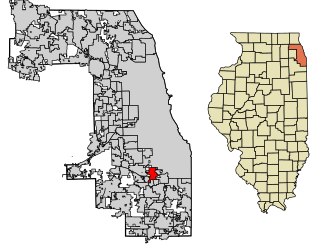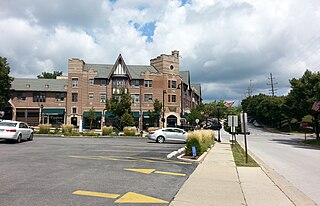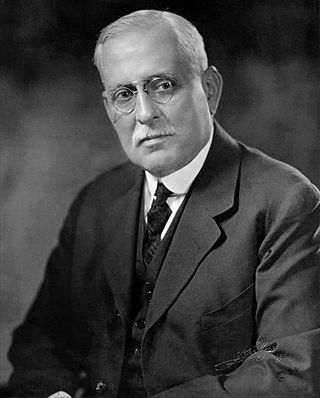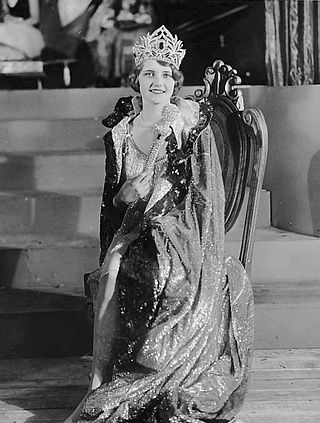Related Research Articles

Chicago is the most populous city in the U.S. state of Illinois and the third-most populous in the United States after New York City and Los Angeles. With a population of 2,746,388 in the 2020 census, it is also the most populous city in the Midwest. As the seat of Cook County, the city is the center of the Chicago metropolitan area, one of the largest in the world.

Blue Island is a city in Cook County, Illinois, located approximately 16 miles (26 km) south of Chicago's Loop. Blue Island is adjacent to the city of Chicago and shares its northern boundary with that city's Morgan Park neighborhood. The population was 22,558 at the 2020 United States Census.

Flossmoor is a village in Cook County, Illinois, United States. The population was 9,704 at the 2020 census. Flossmoor is approximately 24 miles south of The Loop/Downtown Chicago. It is closely tied to neighboring Homewood, sharing a high school and park district.

Woodstock is a city in McHenry County, Illinois, United States. It is located 45 miles northwest of Chicago, making it one of the city's outer-most suburbs. Per the 2020 census, the population was 25,630. The city's historic downtown district and turn-of-the-century town square is anchored by the landmark Woodstock Opera House and the Old McHenry County Courthouse. In 2007 Woodstock was named one of the nation's Dozen Distinctive Destinations by the National Trust for Historic Preservation.

Lyric Opera of Chicago is one of the leading opera companies in the United States. It was founded in Chicago in 1954, under the name 'Lyric Theatre of Chicago' by Carol Fox, Nicola Rescigno and Lawrence Kelly, with a season that included Maria Callas's American debut in Norma. The company was re-organized by Fox in 1956 under its present name and, after her 1981 departure, it has continued to be of one of the major opera companies in the United States. The Lyric is housed in a theater and related spaces in the Civic Opera Building. These spaces are now owned by the Lyric.

Samuel Insull was a British business magnate. He was an innovator and investor based in Chicago who helped create an integrated electrical infrastructure in the United States. Insull created holding companies that purchased utilities and railroads. Insull was responsible for the building of the Chicago Civic Opera House in 1929. Due to the Great Depression, his vast Midwest holding company empire collapsed, and he was accused of profiting personally by selling worthless stock to unsuspecting investors who trusted him because of his position and reputation. Following a seven-week trial, he and 16 co-defendants were acquitted of all charges after two hours of jury deliberation.

Lithuanians in Chicago and the nearby metropolitan area are a prominent group within the "Windy City" whose presence goes back over a hundred years. Today the Chicago area possesses the largest Lithuanian community outside Lithuania, who have dubbed the city as Little Lithuania, and many Lithuanian Americans refer to it as the second capital of Lithuania. Lithuanian Americans from Chicago have had a significant impact on politics in both the United States and Lithuania.

Chicago Lawn is one of the 77 community areas of Chicago, Illinois. It is located on the southwest side of the city. Its community neighbors include Gage Park, West Englewood, Ashburn, and West Lawn. It is bounded by Bell Avenue on the east, Central Park Avenue on the west, 59th Street on the north, and 75th Street on the south, and is 13 km (8.1 mi) southwest of the Loop. Local citizens refer to the area as "Marquette Park," after the park in its center.
The following is a timeline of the history of the city of Chicago, Illinois, United States.

The culture of Chicago, Illinois is known for the invention or significant advancement of several performing arts, including improvisational comedy, house music, industrial music, blues, hip hop, gospel, jazz, and soul.

The Chicago Opera Theater (COT) is an American opera company based in Chicago, Illinois. COT is a resident company at the Harris Theater for Music and Dance in Chicago's Millennium Park and is currently in residence at the newly renovated Studebaker Theater in the historic Fine Arts Building. In addition to productions of selected operas from the core opera repertoire, COT has an emphasis on American composers, Chicago premieres, and producing new contemporary operas for a 21st century audience.

I Lituani is an opera consisting of a prologue and three acts by Amilcare Ponchielli to an Italian libretto by Antonio Ghislanzoni, based on the historical poem Konrad Wallenrod written by Lithuanian-Polish poet Adam Mickiewicz. It premiered at La Scala in Milan on 7 March 1874.
Oskee Wow-Wow is the official fight song of the University of Illinois at Urbana-Champaign. The song was written in 1910 by two students: Harold Vater Hill '11 (1889–1917), credited with the music, and Howard Ruggles Green '12 (1890–1969), credited with the lyrics.
The Civic Opera Company (1922–1931) was a Chicago company that produced seven seasons of grand opera in the Auditorium Theatre from 1922 to 1928, and three seasons at its own Civic Opera House from 1929 to 1931 before falling victim to financial difficulties brought on in part by the Great Depression. The company consisted largely of the remnants of the Chicago Opera Association, a company that produced seven seasons of grand opera in the Auditorium Theatre from 1915 until its bankruptcy in 1921.
The Chicago City Opera Company was a grand opera company in Chicago, organized from the remaining assets of the bankrupt Chicago Grand Opera Company, that produced four seasons of opera at the Civic Opera House from 1935 to 1939 before it too succumbed to financial difficulties. It was succeeded by the Chicago Opera Company.
The Chicago Opera Company was a grand opera company in Chicago, organized from the remaining assets of the bankrupt Chicago City Opera Company, that produced six seasons of opera at the Civic Opera House from 1940 to 1946. Artistic directors included Carlo Peroni (1941–1942) and Fausto Cleva (1944–1946), and until 1945 Fortune Gallo was general manager. After the war, when consumer goods became more abundant and people spent less money on entertainment, interest in opera collapsed and the company went bankrupt. Rather than try to re-organize, the remaining assets were given to the largest creditor, the landlord of the Civic Opera House, Household Finance, who then paid off the other remaining creditors. After the final collapse of an opera company that had been re-organized five times, there was no resident Chicago opera company until the founding of the Lyric Opera in 1954. One of the original group of organizers was Max Rabinoff.

Lois Eleanor Delander was Miss America in 1927.
The Chicago Lighting Institute opened on April 11, 1930 as an educational and marketing association for the lighting industry in the Midwest. Supported by five full corporate members and fifty associate corporate members, it sought to acquaint architects, interior designers, electrical engineers, urban planners and the general public with the latest developments and applications in lighting. It was the largest cooperative Institute fostering better lighting practices in the United States and, as such, was the pioneer U.S. institution promoting appropriate use of light in the earlier years of the lighting industry. In 1968, after 38 years of service, the Institute merged with the Chicago Electric Association.
References
- ↑ "About the Lithuanian Opera Company, Inc. in Chicago". Lithuanian Opera Co. Archived from the original on December 21, 2005. Retrieved September 14, 2006.
- ↑ Marsh, Robert C. "Author's Preface". In Pellegrini, Norman (ed.). 150 Years of Opera in Chicago. DeKalb, Illinois: Northern Illinois University Press. xii. ISBN 0-87580-353-9.
- ↑ Posters by Ada Sutkus for the Lithuanian Opera Company of Chicago